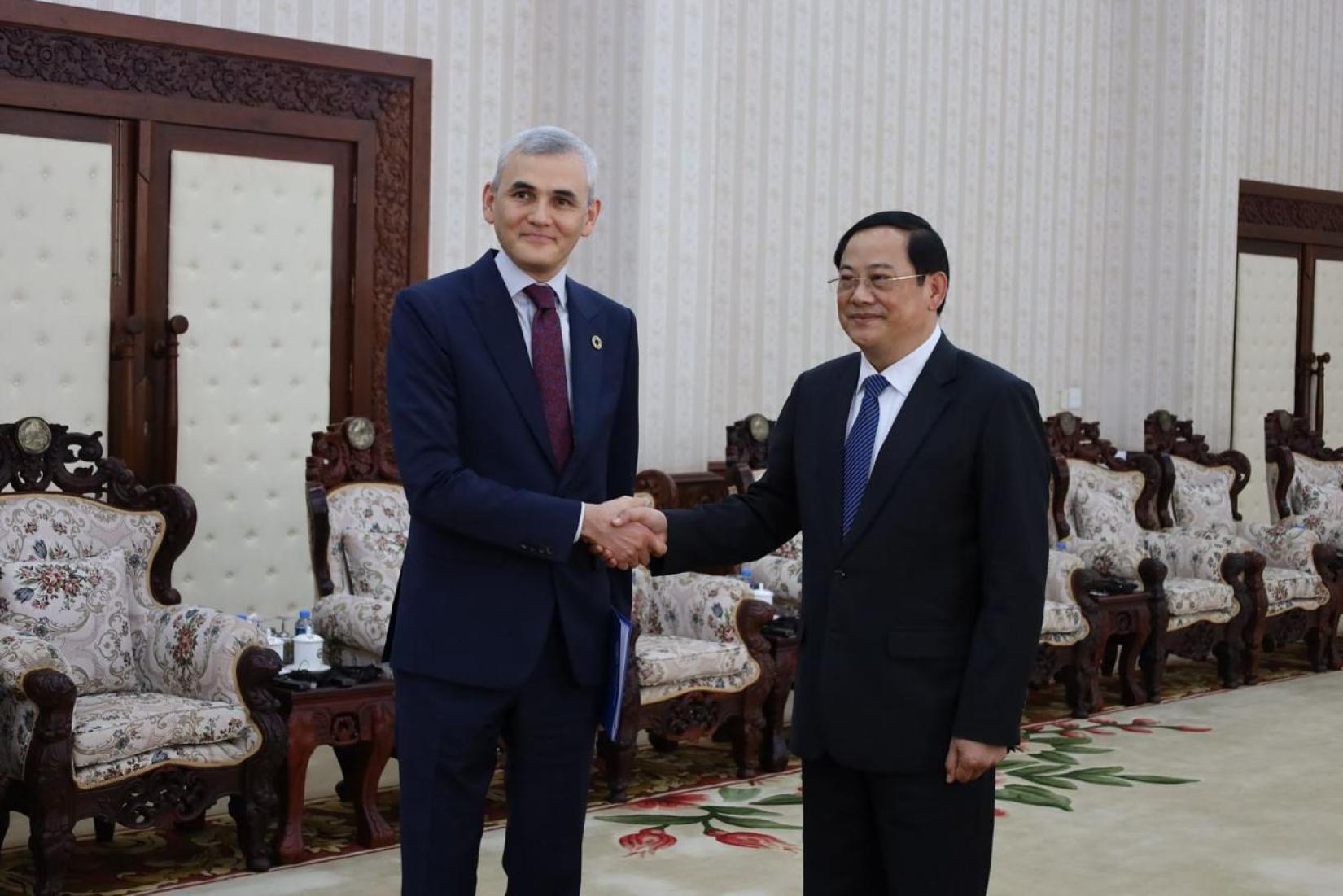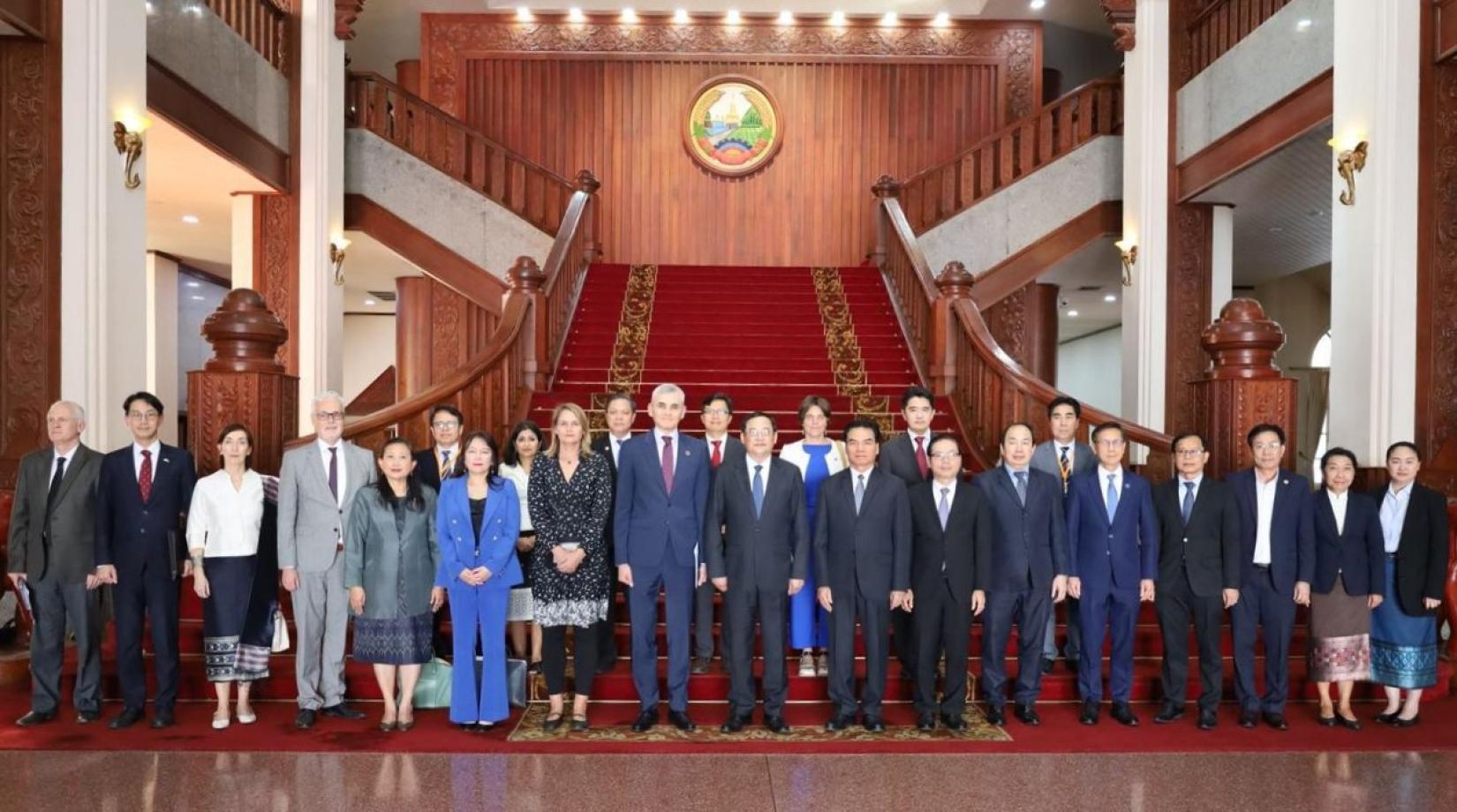Remarks at Debrief with Prime Minister of Lao PDR on the 2024 Round Table Implementation Meeting
Remarks by Bakhodir Burkhanov, UN Resident Coordinator

Thank you, Excellency, for taking the time to meet with us to debrief on the outcomes of the recent Roundtable Implementation Meeting.
As co-chair of the RTIM, it is my pleasure to add to the Minister of Planning and Investment’s summary on behalf of all development partners that engaged in the Meeting. In attendance today, we have some of the Ambassadors, Heads of Missions and co-chairs of Sector Working Groups, who had key roles in the process.
Development partners greatly appreciate the value of the Round Table Process as the principal platform to discuss the development issues facing the country.
We would like to acknowledge the efforts of the MPI in ensuring that the Round Table Process continues to be a rich and insightful engagement. The RTIM once again achieved this goal.
2024 was an important year for the country. I use this opportunity to congratulate the Government of Lao PDR on the success of the year-long ASEAN Chairmanship. International partners rallied behind Laos’ role as Chair, in solidarity with the goals of the ASEAN Community and our collective commitment to Lao PDR’s success. The Government started the process of developing the 10th National Socio-Economic Development Plan, which will run through to the 2030 deadline for achieving the Sustainable Development Goals. And Lao PDR submitted its third Voluntary National Review (VNR) on the implementation of SDGs during the year.
The country is also approaching the anticipated date for LDC graduation, with the UN Committee for Development Policy completing Lao PDR's triannual review in 2024 and confirming the country continues to meet the essential graduation criteria. Excellency Prime Minister, you raised this important point during your meeting with the UN Secretary-General in October. Following your request, the UN system and our parents have begun to work to better understand the consequences of graduation in close concert with our Government counterparts. More work lies ahead on the implementation of the Smooth Transition Strategy for LDC graduation, which requires continued steer from the Government unfer the leadership of the Prime Minister's Office to coordinate efforts across sectors, ministries and institutions.
With these points in mind, allow me to structure my summary of the Roundtable Meeting in two parts:
First, with regards to the implementation of the 9th NSEDP:
We note that continued macroeconomic imbalances weighed on the achievement of targets under the 9th NSEDP, though sustained economic growth in 2024 saw targets for employment perform relatively better.
In this context, the strategic direction for 2025 under the 9th NSEDP to focus on high-quality human resources, addressing rural development and poverty, and conserving natural resources is a welcome development, directing the efforts of policymakers towards those most at risk of being left behind.
The RTIM discussions on sustainable financing of development priorities highlighted the need for improved macroeconomic management, stronger public-private sector collaboration, and targeted policy actions to boost sustainable and green growth.
Some of the key recommendations in this area include expanding the tax base and curtailing tax exemptions; promoting domestic resource mobilization to reduce reliance on external borrowing; prioritizing social sectors spending; and better integration of planning, budgeting and macro-fiscal frameworks. Efforts at productivity improvement and digitalization have been mentioned to underpin private sector engagement. There were also calls to address tariff- and non-tariff trade barriers, which is consistent with our efforts to better understand implications of LDC graduation.
Discussion on human capital highlighted measures that are key to reaching those most affected by the economic and financial difficulties. Recommendations include investing in social protection coverage, poverty alleviation, malnutrition and healthcare access, with a particular focus on the disadvantaged groups, building on the establishment of Social Protection Committees at sub-national level. Greater resilience of vulnerable communities can also be achieved by incorporating climate risk assessments in planning and development strategies.
Once again, RTIM renewed the call to reverse the declining trend in budget allocations for health and education, threatening to undermine efforts to promote human capital development. It was stressed that these allocations are not sunk costs; they are crucial for a healthy, educated and empowered population, which in turn is a bedrock of a competitive economy.
On education, recommendations focused on promoting education and lifelong learning; expanding more equitable access through scholarships, community-based programmes for 5-year-old children and learning support for non-Lao-Tai children; increasing teacher quota and upgrading teacher education policy and training. Further ideas include exploring two streams in upper secondary education, and reassigning surplus secondary teachers to primary schools with targeted training.
The RTIM stressed the connectivity of education and employment for Lao PDR’s sustainable growth, with proposed measures such as supporting jobseekers with training and skills development to meet the needs of the evolving labor market, including improvement in the quality and relevance of TVET.
On health, recommendation included a stronger focus on equitable access to essential health services, and reduction of malnutrition and non-communicable diseases. Proposed measures include strategically investing in a prioritized package of cost-effective nutrition interventions across sectors, including health, agriculture, education and social protection; improving strategic donor transitions in view of LDC graduation while increasing domestic resources including through health taxes; and adopting public-private approaches for better nutrition and health outcomes.
Consistent with the direction of national policies, the Round Table stressed the need to address shortfalls in digital infrastructure, including by encouraging private sector participation to facilitate its building and enhancements.
Protecting women and children from violence will help realize the full benefits of investments in education, health, and nutrition. Harmful practices, including child marriage, undermine well-being, learning and growth. Lao PDR’s ban on corporal punishment—the first in ASEAN—is recognized as a landmark step.
Let me now move to the second set of RTIM outcomes regarding the 10th NSEDP, and cite some reflections from the development partners.
The 10th NSEDP cycle will start in 2026, the year that Lao PDR is scheduled to graduate from LDC status. The period of the 10th NSEDP would therefore coincide with the LDC transition period. The 10th Plan could therefore align its overall direction to reflect this milestone, and reflect the opportunity this transition brings to set ambitions for more domestically-driven reform and development. The Plan will also end in 2030, which coincides with the deadline for the 2030 Agenda, presenting a final opportunity to get as close as possible to fulfilling the country’s SDG aspirations.
The draft NSEDP is a long and detailed document. This makes it challenging for decision-makers to use it as a practical reference document to guide decisions. Simplifying, clarifying and shortening the document could help bring out the priorities, and support improved understanding amongst stakeholders who will implement it. As the apex planning document, the NSEDP need only set out the broad framework; details can be included in corresponding sector and sub-national plans.
Overarching comments from the Round Table with regards to the 10th Plan were: (a) that the Plan should have clearer focus and priorities in view of the tight fiscal space we are experiencing now; (2) that it should be costed to help with the prioritization and to ensure essential investments in the future of the country; and (3) that it should be accompanied by a robust Financing Strategy that looks at ways of raising national revenue and to ensure that chosen priorities can be funded.
Development partners emphasized that a clearly defined Monitoring and Evaluation framework is key to ensuring clarity of the 10th NSEDP priorities. Such a results framework would address many of the key challenges identified in the Mid-Term Review of the 9th Plan.
Strengthening arrangements for financing the Plan, in particular through the enforcement of the Prime Minister’s Decree on State Budget Reform, is essential. Further, the Prime Minister’s decision No. 120/PM, dated 28 August 2024, to oversee the implementation and monitoring of the Financing Strategy requires continued close coordination between the Ministries of Planning and Investment, and of Finance. Ultimately, the financing framework determines how affordable, and therefore how realistic and achievable, the 10th Plan will be. It should tie in with financing strategies of other national and international plans and commitments, including the NDC 3.0.
The following strategic priorities for the 10th Plan were highlighted:
- macro-economic stabilization as a pre-condition to achieving inclusive growth;
- stimulating growth drivers and jobs, while reducing the economy’s dependence on resource-intensive sectors; promoting food security and sustainable management of natural wealth through climate-resilient and nutrition-sensitive agriculture and forestry;
- investing in human capital development (education, healthcare, social protection), including attention to sciences, technology and innovation, all of which are critical as Laos graduates from LDC status and embarks on a digital transformation journey; and
- improving governance and business climate, and fostering private sector development as foundations for achieving economic transformation.
It was also recognized that the structure of the Sector Working Groups, as the key platform for development coordination, can be an effective tool for validating and finalizing the Plan this year.
Development partners would also like to encourage broad-based, inclusive and meaningful consultation with civil society and non-government organizations that play a key role in delivering the outcomes of the Plan and achieving the SDGs. Same is true for the private sector who will be the engine of growth in the coming years, spearheading projects that respect the environment, adhere to decent work and quality standards.
Let me add that the RTIM touched on localization of the Pact for the Future adopted by all Member States in New York last September, and its Global Digital Compact and Declaration on Future Generation. Our collective engagement with the Pact is part and parcel of our ongoing work to reach Lao PDR’s development objectives, including support to financing for development, access to green and climate finance, youth empowerment, and digital transformation, among others.
Excellency Prime Minister, throughout the Round Table deliberations, development partners have shown profound care and solidarity with Lao PDR at its current stage of development. They showed willingness to engage in policy matters and offered viable funding and technical support.
2025 will be a key milestone as this is the year we organize a High-Level Round Table Meeting that is traditionally chaired by Prime Minister. Development partners look forward to continuing this valuable exchange across sectors and policies, building on all elements of the Round Table Process, and culminating in the high-level meeting.
We look forward to your leadership of this year’s Round Table Meeting, and once again thank you, Excellency, for the Government’s commitment to this dialogue.



















